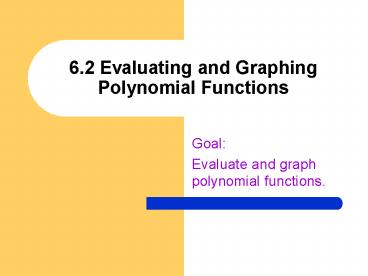6.2 Evaluating and Graphing Polynomial Functions - PowerPoint PPT Presentation
1 / 23
Title:
6.2 Evaluating and Graphing Polynomial Functions
Description:
6.2 Evaluating and Graphing Polynomial Functions Goal: Evaluate and graph polynomial functions. Polynomial Function Function of the form: an is the leading ... – PowerPoint PPT presentation
Number of Views:386
Avg rating:3.0/5.0
Title: 6.2 Evaluating and Graphing Polynomial Functions
1
6.2 Evaluating and Graphing Polynomial Functions
- Goal
- Evaluate and graph polynomial functions.
2
Polynomial Function
- Function of the form
- an is the leading coefficient
- a0 is the constant term
- n is the degree
- Polynomial is in standard form if its terms are
written in descending order of exponents from
left to right.
3
A polynomial function is a function of the form
f (x) an x n an 1 x n 1 a 1 x
a 0
Where an ? 0 and the exponents are all whole
numbers.
For this polynomial function, an is the
leading coefficient, a 0 is the constant term,
and n is the degree.
A polynomial function is in standard form if
its terms are written in descending order of
exponents from left to right.
4
Common Types of Polynomials
Degree Type Standard Form
0 Constant f(x) a0
1 Linear f(x) a1x a0
2 Quadratic f(x) a2x2 a1x a0
3 Cubic f(x) a3x3 a2x2 a1x a0
4 Quartic f(x) a4x4 a3x3 a2x2 a1x a0
5
Identifying Polynomial Functions
Decide whether the function is a polynomial
function. If it is, write the function
in Standard form and state its degree, type, and
leading coefficient.
6
Identifying Polynomial Functions
Decide whether the function is a polynomial
function. If it is, write the function
in Standard form and state its degree, type, and
leading coefficient.
7
Evaluating a Polynomial Function
- One way to evaluate is to use direct substitution.
8
One way to evaluate polynomial functions is to
usedirect substitution. Another way to evaluate
a polynomialis to use synthetic substitution.
9
SOLUTION
2 x 4 0 x 3 (8 x 2) 5 x (7)
Polynomial in standard form
2 0 8 5 7
3
Coefficients
6
18
30
105
35
10
98
2
6
The value of f (3) is the last number you
write, In the bottom right-hand corner.
10
Evaluate using Direct Substitution and Synthetic
Substitution
Direct Substitution Synthetic Substitution
11
Evaluate the Polynomial FunctionUsing Synthetic
Substitution
12
Evaluating a Polynomial Function in Real Life
- The time t (in seconds) it takes a camera battery
to recharge after flashing n times can be modeled
by - Find the recharge time after 100 flashes.
13
Homework
- Pg. 333-334 15 - 45 every 3rd Problem
14
6.2 Continued Graphing Polynomial Functions
- Will use end behavior to analyze the graphs of
polynomial functions.
15
End Behavior
- Behavior of the graph as x approaches positive
infinity (8) or negative infinity (-8) - The expression x?8 as x approaches positive
infinity - The expression x?-8 as x approaches negative
infinity
16
End Behavior of Graphs of Linear Equations
f(x) x
f(x) -x
f(x)?-8 as x?8 f(x)?8 as x?-8
f(x)?8 as x?8 f(x)?-8 as x?-8
17
End Behavior of Graphs of Quadratic Equations
f(x) x²
f(x) -x²
f(x)?-8 as x?8 f(x)?-8 as x?-8
f(x)?8 as x?8 f(x)?8 as x?-8
18
Investigating Graphs of Polynomial Functions
- Use a Graphing Calculator to grph each function
then analyze the functions end behavior by
filling in this statement f(x)?__8 as x?8 and
f(x)?__8 as x?-8 - a. f(x) x³ c. f(x) x4 e. f(x) x5 g. f(x)
x6 - b. f(x) -x³ d. f(x) -x4 f. f(x) -x5 h.
f(x) -x6
19
Investigating Graphs of Polynomial Functions
- How does the sign of the leading coefficient
affect the behavior of the polynomial function
graph as x?8? - How is the behavior of a polynomial functions
graph as x?8 related to its behavior as x?-8
when the functions degree is odd? When it is
even?
20
End Behavior for Polynomial Functions
- For the graph of
- If angt0 and n even, then f(x)?8 as x?8 and
f(x)?8 as x?-8 - If angt0 and n odd, then f(x)?8 as x?8 and
f(x)?-8 as x?-8 - If anlt0 and n even, then f(x)?-8 as x?8 and
f(x)?-8 as x?-8 - If anlt0 and n odd, then f(x)?-8 as x?8 and
f(x)?8 as x?-8
21
Graphing Polynomial Functions
- f(x) x³ x² 4x 1
x -3 -2 -1 0 1 2 3
f(x)
22
Graphing Polynomial Functions
- f(x) -x4 2x³ 2x² 4x
x -3 -2 -1 0 1 2 3
f(x)
23
Homework
- Pg. 334 49-52, 53-71 every 3rd problem






























